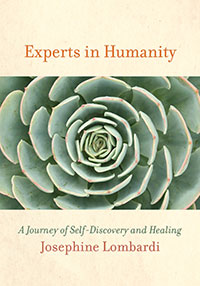
Experts in Humanity: A Journey of Self-Discovery and Healing
 “Do you want to become an expert in humanity? Do you want to see yourself the way God sees you? Do you want to understand those who have hurt you? Do you need to forgive yourself and others?”
“Do you want to become an expert in humanity? Do you want to see yourself the way God sees you? Do you want to understand those who have hurt you? Do you need to forgive yourself and others?”
Josephine Lombardi poses these questions within her book Experts in Humanity: A Journey of Self-Discovery and Healing, giving readers the tools to eventually answer them. Although this book is geared more towards preachers and ministers wishing to help those within their congregation grow as better people, everyday Catholics can also use the text to help themselves. The accessibility of the author’s writing and presentation of ideas provides all readers with the ability to find this book helpful when trying to learn more about humanity within a spiritual context. Lombardi also separates the book into two parts; “Part One: Life Skills” and “Part Two: Factors that Influence Human Behaviour”, which allows the heavy concepts presented to become even more manageable for readers.
The first section focuses on “basic life skills” and how we can improve upon them internally through spirituality in order to further strengthening our relationship to faith. The author includes eight well-thought-out steps that present bettering oneself, as both a human being and a Catholic, to be a manageable task. The incorporation of a fictitious character, Sally, places the concepts that the author presents to us within a relatable setting, displaying how we can work them into our everyday lives. The life skills presented within this first half prepares readers for the more in-depth analysis of humanity that Lombardi describes further along in the book.
Within the second half, Lombardi helps us understand the behavior of ourselves and of those around us through a more scientific point of view. While drawing influence from scientific resources, the author presents human nature to her readers through detailed the examination of a few, clear topics; “past and present experiences”, “genes and inherited tendencies”, “gender and cultural influences” and “faith development and intimacy with God”. We are able to draw connection to these themes within our own lives and learn about their, sometimes detrimental, affect on our freedom to be our best selves. Through this knowledge of humanity she imparts on her readers, Lombardi hopes to help us “overcome [our] past and the patterns that tend to be repeated generation after generation”.
Many of us wish that we could be better people and Catholics but feel as though changing is an impossible task. Josephine Lombardi presents an analysis of the self and human nature in a way that inspires readers to want to reach their fullest potential and encourage those around them to do the same.
Christina D’Agnillo– Marketing Intern


